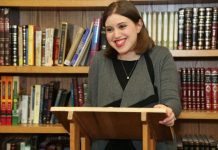
In 2021, Ardmore resident Jeffrey Podell applied for a job with the Department of Defense’s National-Geospatial Intelligence Agency. He was asked to complete an exam as part of his application. It was on a Saturday.
Podell requested “reasonable accommodation,” as the law describes an alteration to a process that is religious in nature. The 42-year-old is a Sabbath-observant Jew.
He didn’t get the accommodation, so he sued. And earlier in January, he reached a favorable settlement in the United States District Court for the Eastern District of Virginia.
“In a settlement agreement reached between Jeffrey Podell and the Department of Defense, it was agreed that a number of significant changes would be made in the operation of the Department of Defense, National Geospatial-Intelligence Agency,” read the news release from Clifford A. Rieders of the Williamsport-based law firm of Rieders, Travis, Dohrmann, Mowrey, Humphrey and Waters, which represented Podell.
“NGA agreed to post the following language on its website: Both applicants for employment and current employees of NGA are entitled to request religious accommodations from generally applicable employment-related rules and requirements, so long as the accommodation requested would not result in an undue hardship to the conduct of NGA’s business,” the release continued. “It is believed that these significant changes will be utilized generally by the Department of Defense, which has not traditionally been receptive to Sabbath-observant Jews.”
Podell should now have a chance to finish his application process, according to Rieders. The Ardmore resident attends services and other activities at Haverford College’s Chabad House and Chabad of the Main Line. He also sits on the board of directors for Congregation Raim Ahuvim in Philadelphia.
But he was not always an Orthodox Jew. In fact, Podell grew up in what he described as “the typical secular/Reform middle-class Jewish household.”
“I went to Hebrew school. I had my bar mitzvah,” he said. “And that was pretty much it.”
Podell “arrived at these deeply held values as I aged because I’m an inquisitive kind of guy,” he said.
“I wanted to learn more than what was taught to me in Hebrew school as a child,” he added.
In college, Podell “felt something pulling at me.” He used to go a week before classes and attend services at a Reform synagogue in Manhattan. One time though, the synagogue was closed, so the security guard pointed him around the corner to the Orthodox synagogue.
“And that was when the aha moment hit me,” Podell recalled.
He saw doctors and lawyers staying after services to talk about the deeper meaning of the Jewish faith. They also discussed how it could be applied to daily life.
“It was really cool,” Podell said. “I just remember these lively discussions.”
After that day, Podell had “relatives who were observant Jews and rabbis I learned from.” His cousin, Richard Epstein, taught him “a lot about the Torah and a little bit about the Talmud.” Epstein, a psychiatrist, also helped Podell understand the “psychological underpinnings of the Jewish faith,” Podell recalled.
Today, Podell said he is “always working on it.” One time at Epstein’s synagogue in Potomac, Maryland, the rabbi told Podell that you could always tell the difference between a Chasid and “a poser.”
“A proper Chasid will say, ‘Yes, I am working on it,’ whereas a poser will say, ‘Yes, I’m observant,’” Podell said. “You take what was there, and you try to put it in practice in your daily living.”
Podell said he is also inspired by “In Flanders Fields,” the poem written during World War I by Canadian physician/soldier John McCrae. Podell read the poem in his youth.
“’To you from failing hands we throw the torch; be yours to hold it high,’” he said, quoting the poem.
“I was absolutely shocked that each time I asked for an accommodation, they just said no,” he added. “They said, ‘You can come in next month on a Saturday, too.’”
During the case, Rieders submitted into evidence an essay by the Brandeis University historian Jonathan Sarna, who focuses on American Jewish history. Sarna explained that Jews have had trouble getting reasonable accommodations for Sabbath observance throughout their history in America.
“It is really a reversal of what has been a problem for those who wanted to be Sabbath observant since the beginning of their arrival in the new world,” Rieders said.






